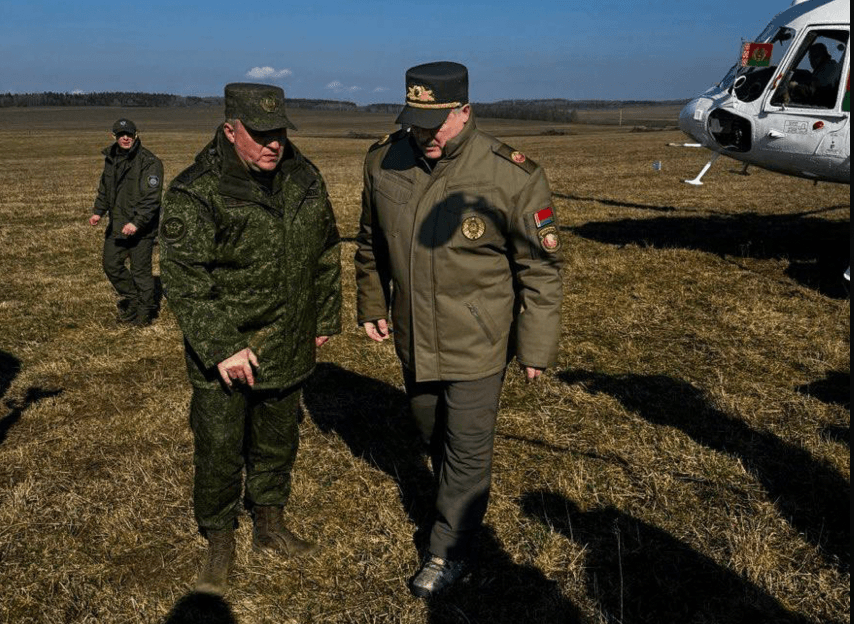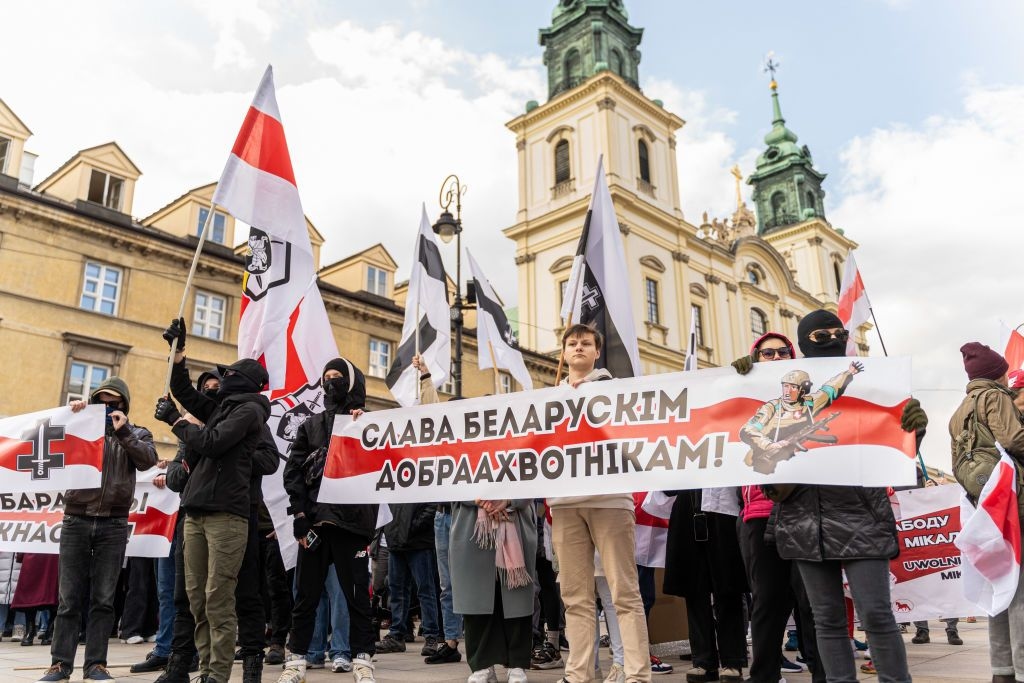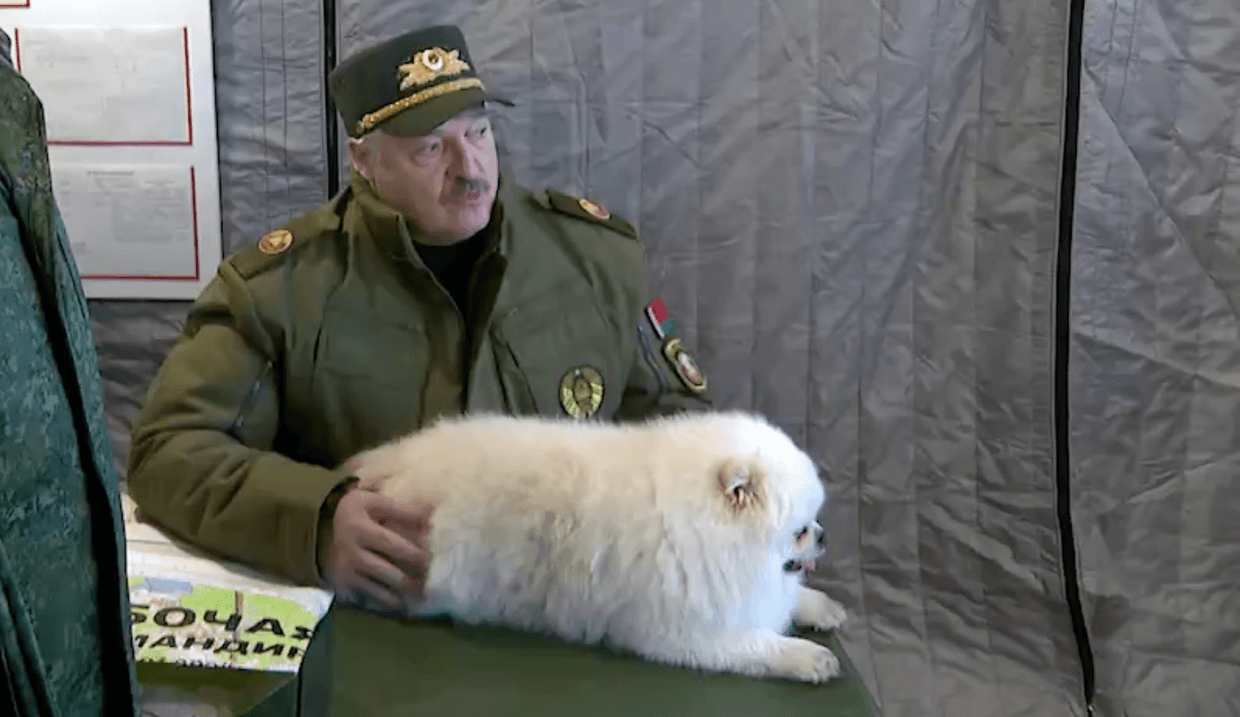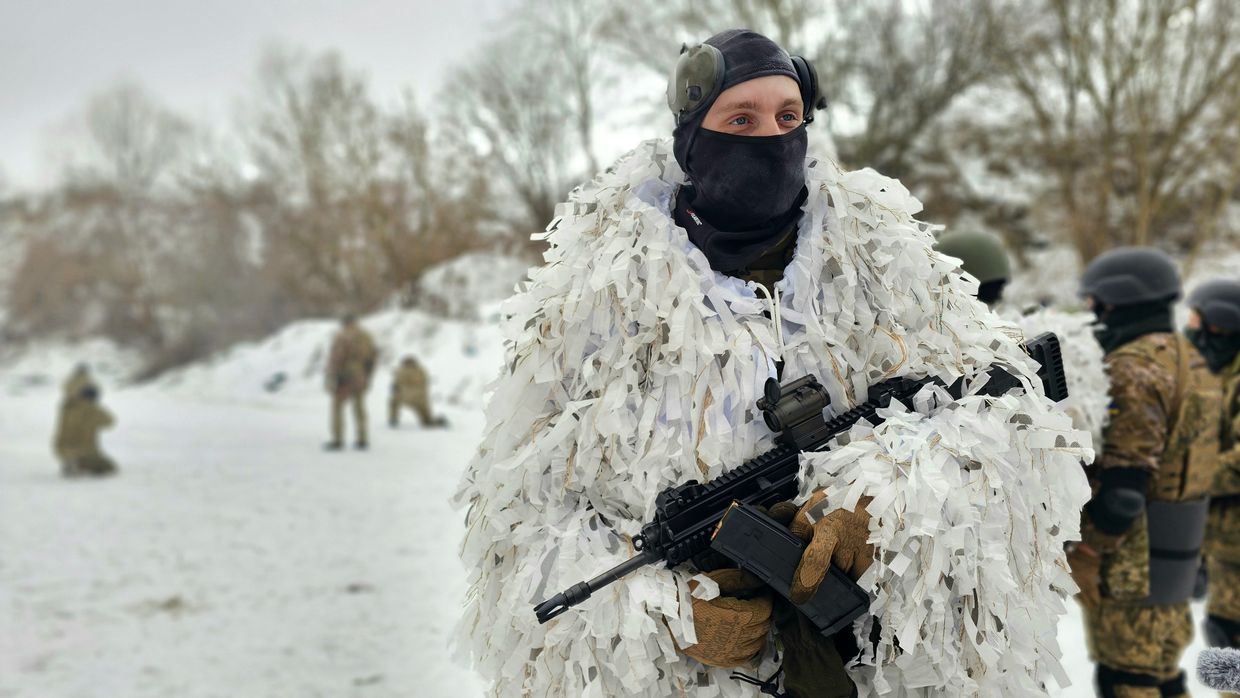Belarus Weekly: Lukashenko torpedoes Putin's attempts to blame Moscow shooting on Ukraine

Belarusians detained for commenting on the Moscow mass shooting, while Alexander Lukashenko torpedoes Putin's attempts to blame the attack on Ukraine.
Belarusian authorities launch a massive raid targeting over 100 "People's Embassies" activists who seek to represent exiled Belarusians in their countries of refuge.
Lukashenko inspects military drills held near the Lithuanian border.
Two more journalists are given harsh prison sentences in Belarus.
The Belarusian regime continues attempts to abuse Interpol's wanted lists to persecute opponents: Belarusian activists fight extradition from Serbia on trumped-up charges.
Lukashenko undermines Putin's attempt to link Ukraine to Moscow mass shooting
Belarusian dictator Alexander Lukashenko has claimed the suspected perpetrators of the terrorist attack in Moscow on March 22 initially tried to flee to Belarus – undermining Russian President Vladimir Putin's attempts to link the attack to Ukraine.
At the same time, three Belarusians were detained in the wake of the attack for commenting online about the massacre.
Lukashenko claimed that Belarus heavily increased security at the border with Russia immediately after the attack and that the terrorists thus "understood that it was impossible to enter Belarus" through Russia's Bryansk Oblast, according to a report that state-owned Belarusian news agency BelTA published on March 26.
The claim undermines the Kremlin narrative, spread by Putin, that alleged perpetrators were attempting to flee to Ukraine.
Meanwhile, at least three Belarusians were detained within the country for commenting on the attack online, according to a Telegram channel linked to Belarus' department for battling organized crime.
One of the detained Belarusians was pictured with a bandaged ear, and the message text insinuated that he had been tortured in a manner similar to that used against one of the alleged terrorists, who had his ear cut off and was then forced to eat it.
In the aftermath of the attack, Belarusian law enforcers deployed armed riot police officers in shopping malls in Belarus and made unsubstantiated claims that terrorists were trying to recruit Belarusian citizens to conduct attacks.
Several gunmen opened fire at the Crocus City Hall in Krasnogorsk, a Moscow suburb, during a concert on the evening of March 22, killing 143 people. Islamic State claimed responsibility for the attack, and the White House said there was no indication that Ukraine was behind it, despite Putin attempting to tie the two.
Belarusian authorities conduct massive raid linked to 'People's Embassies' activists
The Belarusian Investigative Committee has conducted dozens of searches in a criminal investigation into "People's Embassies" activists – diaspora activists advocating for exiled Belarusians in their countries of refuge.
As reported on March 20 by the committee's spokesman, Siarhei Kabakovich, over 100 activists are suspects in the case.
According to the investigators, the representatives of "radical diasporas" have created an extremist formation, seeking to "discredit the country" and interfere with Belarusian diplomats' contacts with foreign governments and organizations.
An official statement from the committee suggests that People's Embassies activists might be charged in absentia, facing up to a seven-year prison term and asset seizures. The committee claims its agents have identified 30 properties belonging to the activists.

The People's Embassies network was launched on Dec. 10, 2020, with the aim of serving exiled Belarusians in 20 countries, including European Union member states, the United Kingdom, Canada, Australia and Brazil. People's Embassies advocate for Belarusians' rights in their respective countries, counter the use of the Interpol "Red List" system to persecute Belarusians abroad, and run cultural and information campaigns.
The Lukashenko regime's diplomatic presence in Europe has shrunk over the past four years.
In 2023, the Belarusian dictator banned Belarusian embassies from providing core consular services such as issuing new passports, to Belarusians who oppose the regime and who have taken refuge abroad.
Those of Lukashenko's opponents who return to Belarus to renew their passports risk losing their freedom: Viasna has recorded at least 207 cases of people being detained upon returning to Belarus.
Currently, according to Viasna's data, Belarus has 1,405 political prisoners.
Lukashenko inspects troops holding drills near Lithuanian border
While visiting a tank battalion deployed near the Lithuanian border, Belarusian dictator Alexander Lukashenko has ordered his military "to meet any provocation with force," his press office reported on March 26.
The Belarusian Armed Forces have been conducting drills in the country's western regions since March 11. Over 5,000 soldiers took part in the training.
Lukashenko claimed that the NATO defense alliance was "provoking" Belarus to respond in some way."
The drills involved the 19th Mechanized Brigade of the Northwestern Operational Command, which was deployed to Ashmiany District in the westernmost part of the country, as well as the 6th Mechanized Brigade and artillery units of the Western Command.
Belarusian First Deputy Defense Minister Viktar Gulevich claimed the Belarusian military drills were a response to NATO's Steadfast Defender 2024 and Dragon-24 exercises.

The Steadfast Defender 2024 exercise is taking place in Central Europe between January and May 2024, involving over 90,000 troops from all 32 NATO member states. It is claimed to be the largest military exercise since the end of the Cold War.
Two more journalists receive harsh prison terms in Belarus
Courts in Belarus sentenced former RFE/RL journalist Ihar Karnei and freelance cameraman Andrei Tolchyn to prison terms and fines in two separate cases on March 21-22.
Karnei's trial in a Minsk court resulted in the RFE/RL journalist being handed down a three-year prison term and a fine of roughly $6,000 on March 22.
The 56-year-old journalist was charged with "participating in extremist formation" due to his work with the Belarusian Association of Journalists, an independent union that was dissolved in 2021 and designated as an extremist organization in February 2023.
Diplomats from the European Union, Austria, the Netherlands, Slovakia, Sweden, Germany, Poland, and the United Kingdom went to the court to support Karnei. Belarus's Human rights activists declared Karnei a political prisoner on March 25.
Meanwhile, Homiel Regional Court handed down a two-and-a-half-year sentence to journalist Andrei Tolchyn for allegedly "aiding extremist activities" and insulting Belarusian dictator Alexander Lukashenko.
The 64-year-old Tolchyn worked as a freelance contributor to the independent media. Prior to journalism, Tolchyn was involved in professional union activism and with the now-dissolved United Civic Party – a liberal political party that opposed the Lukashenko regime.
According to the Belarusian Association of Journalists, 34 journalists are currently in custody in Belarus due to their work. They were jailed after fraudulent presidential elections in Belarus in 2020 produced another "landslide" victory for Lukashenko and sparked nationwide unrest.
Lukashenko unleashed a targeted campaign against journalists throughout 2020, with 477 journalists being detained for participation in the protests – despite being clearly identifiable as members of the press. Some 67 of them experienced violence in detention, human rights organizations say. In 2021, the majority of the independent news outlets in Belarus were raided and dissolved, their leadership detained, and over 400 journalists forced into exile.
Belarusian activist fights extradition from Serbia on politically motivated grounds
A new extradition trial began on March 26 in Serbia, where Belarusian film director and activist, Andrei Hniot, is fighting off an Interpol search warrant issued by Belarusian police.
Hniot was detained in October 2023 in Serbia based on tax evasion charges issued by Belarusian police. Belarusian prosecutor Anton Zaharouskiy, sanctioned by the European Union for prosecuting veteran politician Andrei Sannikov, insists that Hniot evaded paying EUR 300,000 in taxes.
Hniot maintains that the charges refer to his business activities between 2012 and 2018, while the law that laid grounds for such charges was introduced only in 2019 and has no retroactive effect. His defense insists that the prosecution is politically motivated and that Hniot may face torture if he is returned to his home country.
Yulia Haryachaya, spokeswoman for the People's Crisis Management, an organization of the Belarusian democratic opposition in exile, said that Belarus is using Interpol for repressive purposes.
In December 2023, the trial court in Serbia approved Hniot's deportation to Belarus, but in March 2024, the Superior Court (appellate) reversed the decision and sent the case for review.
Interpol temporarily blocked access to the director's data in its database on Feb. 27. Hniot has been in custody awaiting a decision on his extradition case for over five months.
Diplomats from the European Union, Austria, the Netherlands, Slovakia, Sweden, Germany, Poland, and the United Kingdom went to the court to support Karnei. Human rights activists in Belarus declared Karnei to be a political prisoner on March 25.
Hniot is a Belarusian journalist, filmmaker, and political activist. He is described as a co-founder of the "Free Association of Athletes SOS BY," which has been declared an "extremist formation" in Belarus.
The organization played an integral role in persuading the International Olympic Committee to terminate financing of the Belarusian National Olympic Committee, then headed by Lukashenko himself.












